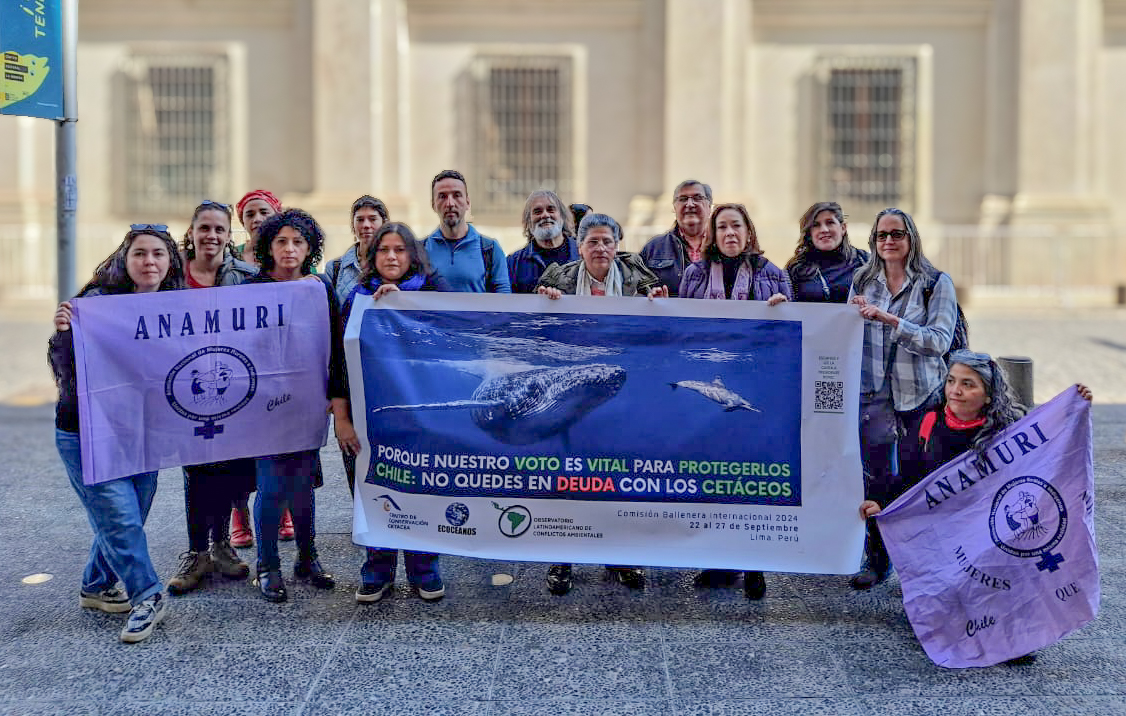Santiago, Chile, September 18, 2024 (Ecoceanos News) – Just three days before the start of the 69th Plenary Meeting of the International Whaling Commission (IWC) in Lima, Peru, the Chilean government has finally settled its two-year debt with the global body responsible for the conservation and management of whale populations, following a strong campaign led by national and international socio-environmental organizations.
Since August 27, the Cetacean Conservation Center, Ecoceanos Center, and the Latin American Observatory of Environmental Conflicts (OLCA) had been urgently requesting the government of Gabriel Boric to clear the debt. This call was supported by over 65 organizations from 16 countries and international NGOs, representing the voices of millions of people around the world who were baffled by the lack of action of the chilean authorities in such a critical issue as the conservation of whales.
According to sources within the Chilean government, the payment to the IWC has been successfully processed, thereby granting Chile voting rights at the upcoming global forum scheduled for September 22 to 27 in Lima, Peru. At this assembly, there are mounting concerns that the whaling bloc may advance proposals to lift the longstanding global moratorium on commercial whaling, a safeguard that has protected these species from slaughter for over four decades.
Elsa Cabrera, executive director of the Cetacea Conservation Center, expressed her satisfaction, stating, “Thanks to the powerful mobilization of civil society, the authorities have finally responded positively. Chile will arrive at the IWC plenary assembly with the right to vote, which is crucial for defending whales against proposals aimed at lifting the moratorium on commercial whaling. These proposals, backed by the Japanese government despite its non-membership in this international organization, will be put forth in Peru, highlighting the importance of our country’s voice in the ongoing debate over whale protection.”
Cabrera expressed her hope that “this situation will not arise again in the future and that authorities will ensure timely payment of membership dues. This is essential for effectively representing our commitment to state policies that continuously defend the moratorium on commercial whaling, promote the non-lethal use of cetaceans, and safeguard these species in both national and international waters.”
For Juan Carlos Cárdenas, Director of the Ecoceanos Center, the Chilean government’s decisive action to overcome its previous inaction and secure full voting rights at the 69th Plenary Assembly of the IWC in Peru signifies the essential role that citizen engagement plays in influencing state actions and institutional decisions. He emphasized that this achievement “is a testament to the collective efforts of more than 65 Chilean and international socio-environmental organizations, which have harnessed social networks and coordinated pressure to galvanize political will among nations. Their unified stance is crucial in maintaining the existing moratorium on whaling and resisting Japan’s attempts to revive commercial whaling practices in international waters.”
Cárdenas called to “strengthen the unity of organizations defending oceans and their biodiversity, and to remain vigilant against this new expansionist phase of Japan, which is utilizing the ‘geopolitical diplomacy of the harpoon’ to expand its presence through its commercial whaling interests in the Pacific, Southern Ocean and Antarctic waters.”
Lucio Cuenca, director of the Latin American Observatory of Environmental Conflicts, OLCA, affirmed that “it is undoubtedly good news that the government has finally paid and updated Chile’s membership in the IWC, allowing it to participate in this global event with voting rights. We positively highlight the decisive role of socio-environmental organizations, both in making this situation visible and in generating the actions that pushed the government to update its participation with voting rights.”
“In light of this incident, which has cast doubt on Chile’s historical commitment to whale protection and generated legitimate concern among citizens, we believe that the government should transparently communicate its position ahead of the next meeting from September 22 to 27 in Lima at the IWC. “The call is to resist the pressures exerted by Japan and to steadfastly uphold the moratorium on whaling while ensuring the protection of whales in both national and international maritime territories,” Cuenca specified.
For more information, contact:
Isabel Diaz Medina
Journalist (+56 9) 54024239



